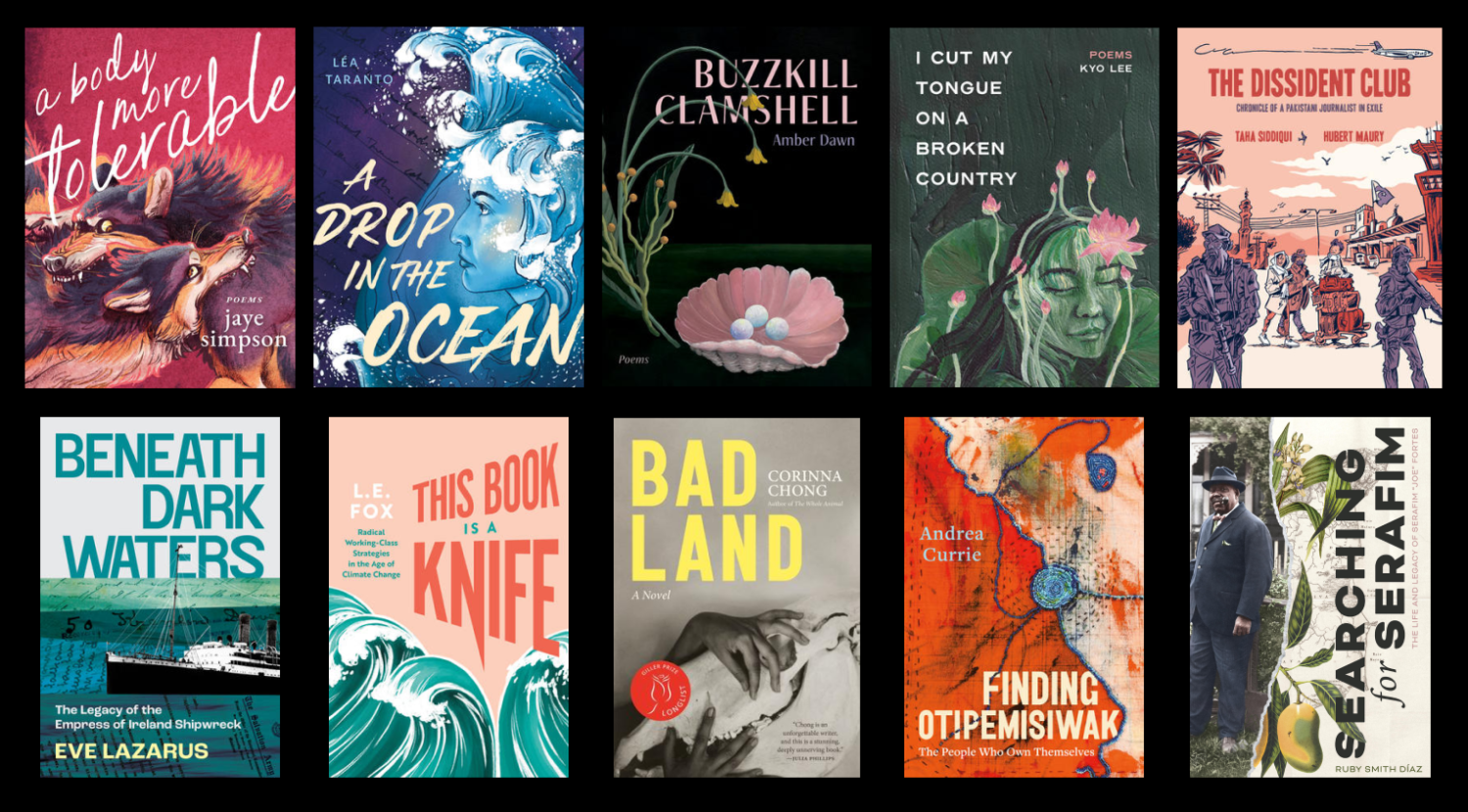Vancouver-based publisher Arsenal Pulp Press is renowned for amplifying diverse voices and pushing the boundaries of contemporary literature. With over 400 titles currently in print, Arsenal Pulp publishes between 15 and 20 new titles per year, as well an average of 25 to 30 reprints. From literary fiction, nonfiction and poetry, books on social issues, gender studies, LGBTQ2S+ and BIPOC literature, to graphic novels, cookbooks, alternative crafts, and more, Arsenal Pulp is interested in literature that engages and challenges readers, and which asks probing questions about the world around us.
BC Creates interviewed publisher Brian Lam to gain perspective on the press’s distinctive approach to publishing and its unique place in the literary landscape.

A few of Arsenal Pulp Press’s recent titles.
Tell us about Arsenal Pulp Press’s beginnings.
Arsenal Pulp Press originally started in 1971 by a group of university students and local writers disheartened by the Toronto-centric bias of Canadian publishing at the time. Throughout the 1970s, it also ran a printing press, and published pamphlets and posters in addition to books. I joined the company in 1984 as a creative writing major from the University of Victoria; it had been my intention to become a writer but through my work at Pulp, I came to realize that publishing the works of others was more satisfying to me. In my earliest days, I did a little bit of everything: editing, typesetting, shipping orders, selling to bookstores, calling on media. I remember a few years after I started, money was tight, so I borrowed a couple thousand dollars from a friend to pay off a printing bill so that we could order a reprint. When I told that story to Stephen Osborne, the press’ founder and then co-owner, he said, “Now you’re a real publisher!”
What makes a book distinctly “Arsenal Pulp”? Is there a quality or energy you look for?
Arsenal Pulp books tend to have an outsider quality to them; we strive to publish work by writers who seek to challenge the status quo. This has meant many books written by members of traditionally marginalized communities, including BIPOC and LGBTQ2S+.
What stories do you think still lack visibility in Canadian publishing—and why?
It’s been gratifying to see other publishers’ lists become more diverse, but there will always be stories from communities that haven’t been heard from before. Moreover, as publishers, we always have to be listening – as such, it’s not just what stories get told, but who gets to tell those stories. I think the backlash against diversity, equity and inclusion that we’ve been seeing in recent months at the highest levels of authority speaks to the fact that we cannot take any of it for granted; that those who argue for diversity can just as easily be quashed again by the powers that be. I think that’s why independent presses in Canada are so important; we’re the ones who will continue to publish those outside of traditional margins if and when larger publishers deem it unfashionable or not lucrative enough.
Arsenal Pulp has long been at the forefront of publishing queer, racialized, and marginalized voices—how do you see your role in shaping Canadian literary culture?
I like to think of publishing as a political act – that at the heart of every book we publish is a desire to reshape society as one that is kind, empathetic, and just.
How do you define a “successful” book in today’s landscape?
We deem a book successful if we feel we have done justice to the author’s original vision for their book. Success can’t be determined by the number of awards a book has won, or how many copies it’s sold; success is when an author tells us how happy they are with their finished book. Some of my favourite books that we’ve published are those that didn’t necessarily sell a lot, but ones where I felt we were on the same creative plane with the author as we worked together to create something magical. It’s not about the destination, but the journey.
What’s your acquisitions process like? And how do you balance editorial instinct with market considerations?
We publish 15 to 20 books per year in a multitude of different genres, from fiction and non-fiction to graphic novels and children’s picture books. Our editorial choices are decided upon by myself, our associate publisher, and our two editors from a mix of agented and unsolicited manuscripts, as well as proposals or even mere ideas. The experience of our authors range from first-timers (which this year includes a high school senior, poet Kyo Lee) to writers with multiple books to their credit.
When I think about it, almost all of our acquisitions have been instinctual. I gravitate toward manuscripts that I respond to viscerally on some level, whether it’s an intriguing subject matter, character, or writing style. We only want to work on books that we personally love and/or feel connected to. Surprisingly, market considerations don’t play a huge role in our editorial choices, but I think our instincts win out, as many of our top selling books, such as Joshua Whitehead’s Jonny Appleseed, Catherine Hernandez’s Scarborough, and Francesca Ekwuyasi’s Butter Honey Pig Bread, were chosen for publication not because of the “market,” but because they were beautifully written.
How do you support writers through doubt or revision?
We offer encouragement to our writers whenever needed. Authors may express distress over revisions not going well, or not being able to meet their deadlines. We usually respond by talking to them directly to offer reassurance or ideas on how to cope. In some cases, we have postponed books if necessary; we feel it’s more important to give authors enough breathing room to finish their work than to stick to rigid schedules.
Has your perspective on what makes a lasting book changed over time?
Sometimes one doesn’t realize the impact of a book until years after it’s been published. I recently experienced this when Sarah Kramer, author of several seminal vegan cookbooks including How It All Vegan, sadly passed away from cancer. In numerous online tributes to Sarah, many people expressed how profoundly Sarah’s books had changed their lives when they were young and wanting to adopt a diet free of animal products at a time when veganism was viewed as radical and/or oddball. In 1999, we published How It All Vegan because it was exciting to see Sarah and her co-author Tanya Barnard take such a fun and youthful approach to vegan food; little did we know it would be groundbreaking.
There have also been times when folks have approached me at book fairs or launches to tell me that they grew up reading our queer books, such as those by Ivan Coyote or Amber Dawn, and that these books had helped them to come out and realize their essential selves. This means more to me than being a Globe and Mail bestseller.
What trends in the literary world are you excited for?
I’m not really big on trends, but I am watching to see if the cultural backlash against DEI will have an effect on publishers’ programs. I hope not; I believe that diversity is not a trend, but here to stay.
What advice would you give to emerging writers hoping to publish with Arsenal Pulp?
I would say, write in your authentic voice and tell your story the way you want it to be told. Authenticity is at the heart of every book we publish; without it, a book will be unsuccessful. The worst thing a writer can do is to write to, or for, a market; if a book is authentic and well written, the market will come to you.
Discover Arsenal Pulp Press and find your next favourite book on their website. Join the mailing list to keep up with the latest from Arsenal Pulp.


